Analyzing SASOL Limited in the Global Business Environment Report
VerifiedAdded on 2021/01/15
|8
|2399
|318
Report
AI Summary
This report provides a comprehensive analysis of SASOL Limited within the global business environment. It begins with an introduction to the concept of the global business environment and then delves into a case study of SASOL Limited. The report applies the McKinsey 7S model to explain the organization's structure, culture, and governance. It also examines the influence of Hofstede's Dimensions of Culture on SASOL's operations and evaluates ethical and sustainable factors considered in the global market. Furthermore, the report discusses factors affecting decision-making in a global context and analyzes SASOL's strategic expansion routes, outlining both advantages and disadvantages. The report concludes by summarizing the key findings and emphasizing the impact of globalization on business operations. References to relevant sources are also provided.
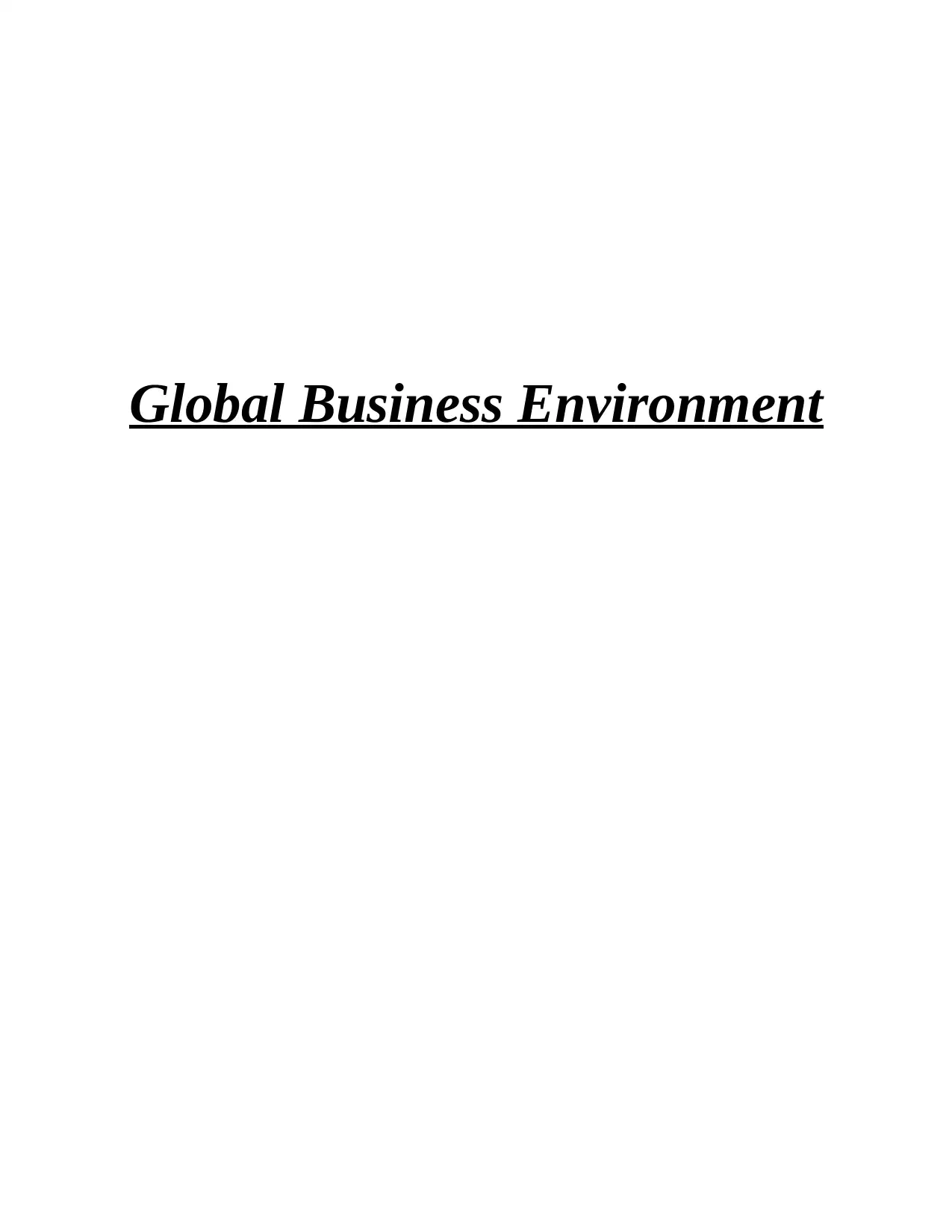
Global Business Environment
Paraphrase This Document
Need a fresh take? Get an instant paraphrase of this document with our AI Paraphraser
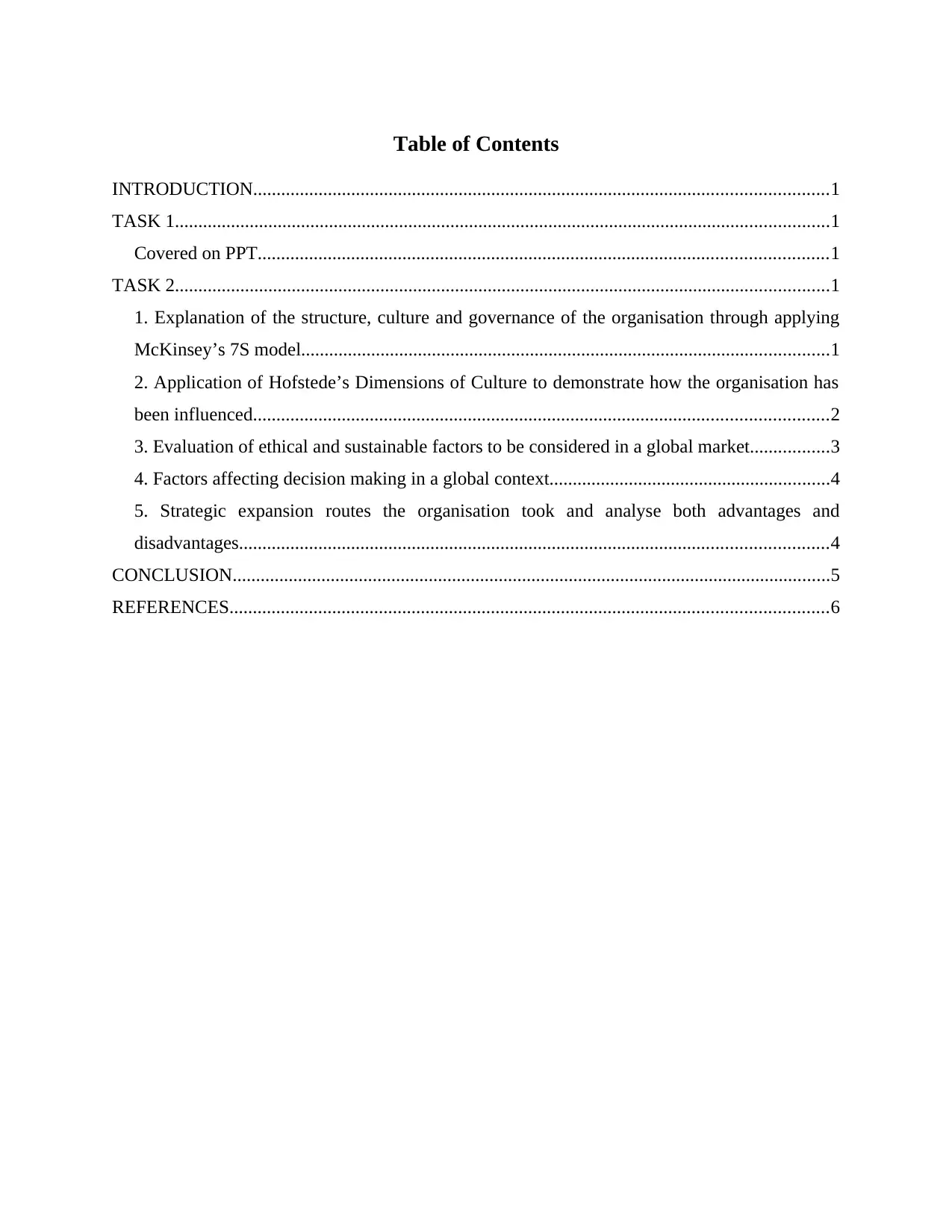
Table of Contents
INTRODUCTION...........................................................................................................................1
TASK 1............................................................................................................................................1
Covered on PPT..........................................................................................................................1
TASK 2............................................................................................................................................1
1. Explanation of the structure, culture and governance of the organisation through applying
McKinsey’s 7S model.................................................................................................................1
2. Application of Hofstede’s Dimensions of Culture to demonstrate how the organisation has
been influenced...........................................................................................................................2
3. Evaluation of ethical and sustainable factors to be considered in a global market.................3
4. Factors affecting decision making in a global context............................................................4
5. Strategic expansion routes the organisation took and analyse both advantages and
disadvantages..............................................................................................................................4
CONCLUSION................................................................................................................................5
REFERENCES................................................................................................................................6
INTRODUCTION...........................................................................................................................1
TASK 1............................................................................................................................................1
Covered on PPT..........................................................................................................................1
TASK 2............................................................................................................................................1
1. Explanation of the structure, culture and governance of the organisation through applying
McKinsey’s 7S model.................................................................................................................1
2. Application of Hofstede’s Dimensions of Culture to demonstrate how the organisation has
been influenced...........................................................................................................................2
3. Evaluation of ethical and sustainable factors to be considered in a global market.................3
4. Factors affecting decision making in a global context............................................................4
5. Strategic expansion routes the organisation took and analyse both advantages and
disadvantages..............................................................................................................................4
CONCLUSION................................................................................................................................5
REFERENCES................................................................................................................................6
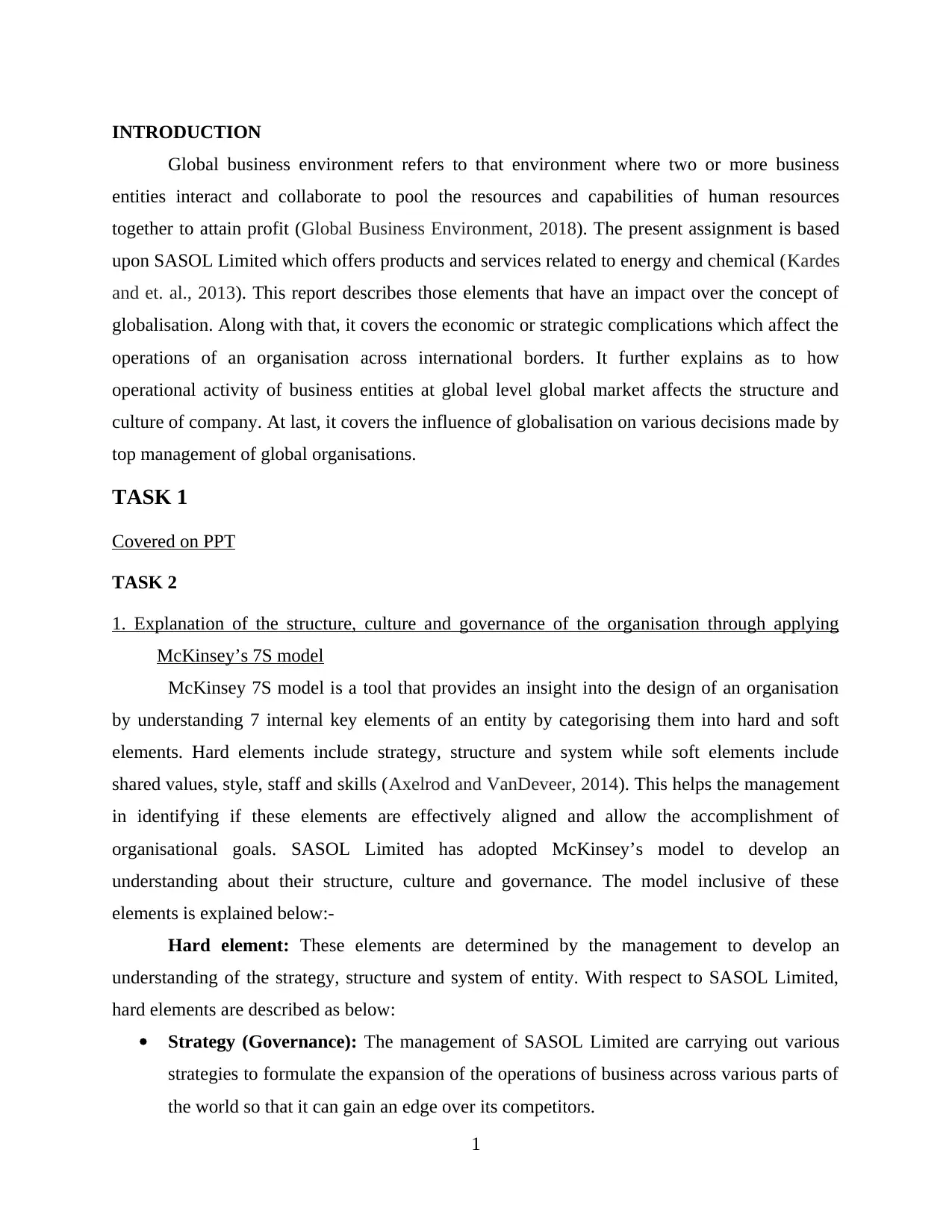
INTRODUCTION
Global business environment refers to that environment where two or more business
entities interact and collaborate to pool the resources and capabilities of human resources
together to attain profit (Global Business Environment, 2018). The present assignment is based
upon SASOL Limited which offers products and services related to energy and chemical (Kardes
and et. al., 2013). This report describes those elements that have an impact over the concept of
globalisation. Along with that, it covers the economic or strategic complications which affect the
operations of an organisation across international borders. It further explains as to how
operational activity of business entities at global level global market affects the structure and
culture of company. At last, it covers the influence of globalisation on various decisions made by
top management of global organisations.
TASK 1
Covered on PPT
TASK 2
1. Explanation of the structure, culture and governance of the organisation through applying
McKinsey’s 7S model
McKinsey 7S model is a tool that provides an insight into the design of an organisation
by understanding 7 internal key elements of an entity by categorising them into hard and soft
elements. Hard elements include strategy, structure and system while soft elements include
shared values, style, staff and skills (Axelrod and VanDeveer, 2014). This helps the management
in identifying if these elements are effectively aligned and allow the accomplishment of
organisational goals. SASOL Limited has adopted McKinsey’s model to develop an
understanding about their structure, culture and governance. The model inclusive of these
elements is explained below:-
Hard element: These elements are determined by the management to develop an
understanding of the strategy, structure and system of entity. With respect to SASOL Limited,
hard elements are described as below:
Strategy (Governance): The management of SASOL Limited are carrying out various
strategies to formulate the expansion of the operations of business across various parts of
the world so that it can gain an edge over its competitors.
1
Global business environment refers to that environment where two or more business
entities interact and collaborate to pool the resources and capabilities of human resources
together to attain profit (Global Business Environment, 2018). The present assignment is based
upon SASOL Limited which offers products and services related to energy and chemical (Kardes
and et. al., 2013). This report describes those elements that have an impact over the concept of
globalisation. Along with that, it covers the economic or strategic complications which affect the
operations of an organisation across international borders. It further explains as to how
operational activity of business entities at global level global market affects the structure and
culture of company. At last, it covers the influence of globalisation on various decisions made by
top management of global organisations.
TASK 1
Covered on PPT
TASK 2
1. Explanation of the structure, culture and governance of the organisation through applying
McKinsey’s 7S model
McKinsey 7S model is a tool that provides an insight into the design of an organisation
by understanding 7 internal key elements of an entity by categorising them into hard and soft
elements. Hard elements include strategy, structure and system while soft elements include
shared values, style, staff and skills (Axelrod and VanDeveer, 2014). This helps the management
in identifying if these elements are effectively aligned and allow the accomplishment of
organisational goals. SASOL Limited has adopted McKinsey’s model to develop an
understanding about their structure, culture and governance. The model inclusive of these
elements is explained below:-
Hard element: These elements are determined by the management to develop an
understanding of the strategy, structure and system of entity. With respect to SASOL Limited,
hard elements are described as below:
Strategy (Governance): The management of SASOL Limited are carrying out various
strategies to formulate the expansion of the operations of business across various parts of
the world so that it can gain an edge over its competitors.
1
⊘ This is a preview!⊘
Do you want full access?
Subscribe today to unlock all pages.

Trusted by 1+ million students worldwide
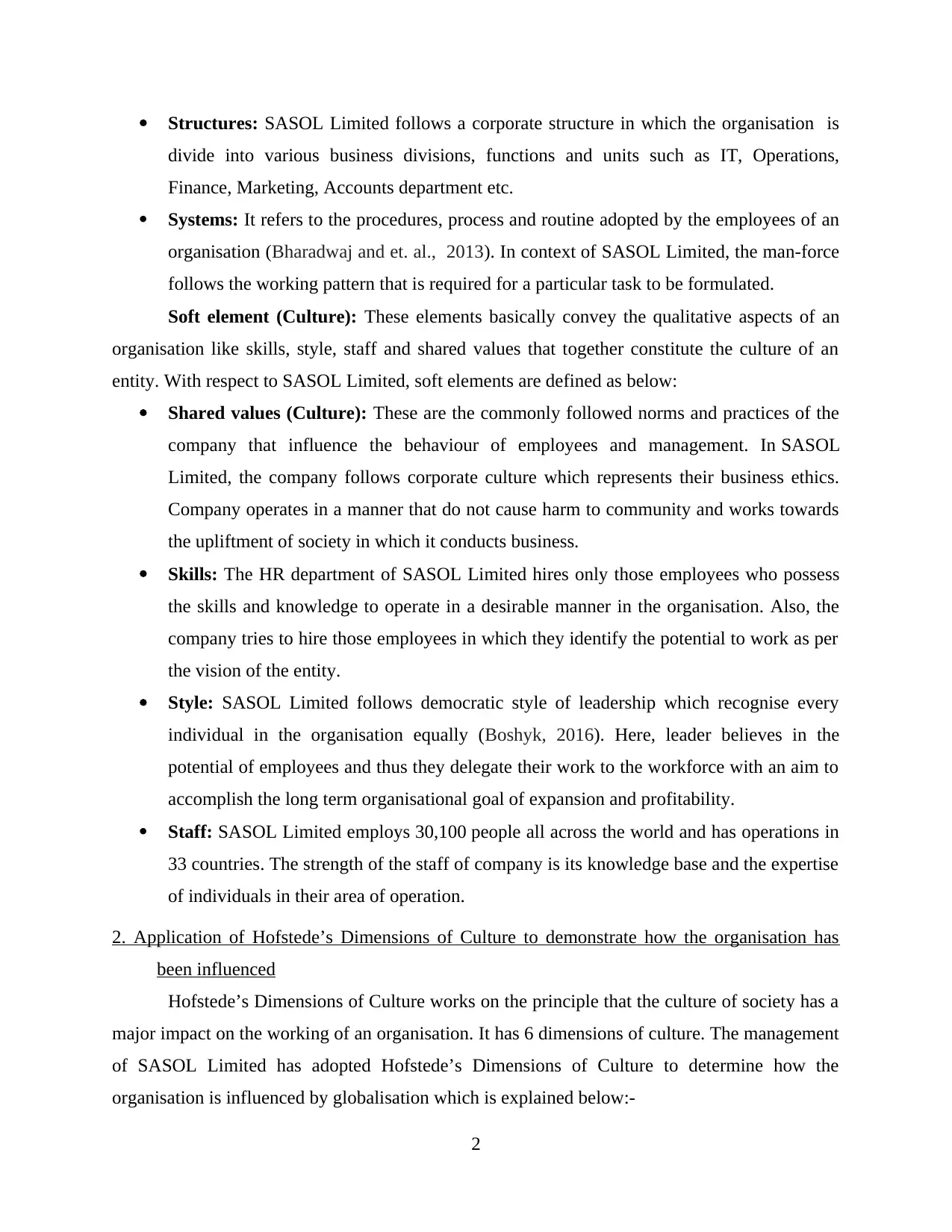
Structures: SASOL Limited follows a corporate structure in which the organisation is
divide into various business divisions, functions and units such as IT, Operations,
Finance, Marketing, Accounts department etc.
Systems: It refers to the procedures, process and routine adopted by the employees of an
organisation (Bharadwaj and et. al., 2013). In context of SASOL Limited, the man-force
follows the working pattern that is required for a particular task to be formulated.
Soft element (Culture): These elements basically convey the qualitative aspects of an
organisation like skills, style, staff and shared values that together constitute the culture of an
entity. With respect to SASOL Limited, soft elements are defined as below:
Shared values (Culture): These are the commonly followed norms and practices of the
company that influence the behaviour of employees and management. In SASOL
Limited, the company follows corporate culture which represents their business ethics.
Company operates in a manner that do not cause harm to community and works towards
the upliftment of society in which it conducts business.
Skills: The HR department of SASOL Limited hires only those employees who possess
the skills and knowledge to operate in a desirable manner in the organisation. Also, the
company tries to hire those employees in which they identify the potential to work as per
the vision of the entity.
Style: SASOL Limited follows democratic style of leadership which recognise every
individual in the organisation equally (Boshyk, 2016). Here, leader believes in the
potential of employees and thus they delegate their work to the workforce with an aim to
accomplish the long term organisational goal of expansion and profitability.
Staff: SASOL Limited employs 30,100 people all across the world and has operations in
33 countries. The strength of the staff of company is its knowledge base and the expertise
of individuals in their area of operation.
2. Application of Hofstede’s Dimensions of Culture to demonstrate how the organisation has
been influenced
Hofstede’s Dimensions of Culture works on the principle that the culture of society has a
major impact on the working of an organisation. It has 6 dimensions of culture. The management
of SASOL Limited has adopted Hofstede’s Dimensions of Culture to determine how the
organisation is influenced by globalisation which is explained below:-
2
divide into various business divisions, functions and units such as IT, Operations,
Finance, Marketing, Accounts department etc.
Systems: It refers to the procedures, process and routine adopted by the employees of an
organisation (Bharadwaj and et. al., 2013). In context of SASOL Limited, the man-force
follows the working pattern that is required for a particular task to be formulated.
Soft element (Culture): These elements basically convey the qualitative aspects of an
organisation like skills, style, staff and shared values that together constitute the culture of an
entity. With respect to SASOL Limited, soft elements are defined as below:
Shared values (Culture): These are the commonly followed norms and practices of the
company that influence the behaviour of employees and management. In SASOL
Limited, the company follows corporate culture which represents their business ethics.
Company operates in a manner that do not cause harm to community and works towards
the upliftment of society in which it conducts business.
Skills: The HR department of SASOL Limited hires only those employees who possess
the skills and knowledge to operate in a desirable manner in the organisation. Also, the
company tries to hire those employees in which they identify the potential to work as per
the vision of the entity.
Style: SASOL Limited follows democratic style of leadership which recognise every
individual in the organisation equally (Boshyk, 2016). Here, leader believes in the
potential of employees and thus they delegate their work to the workforce with an aim to
accomplish the long term organisational goal of expansion and profitability.
Staff: SASOL Limited employs 30,100 people all across the world and has operations in
33 countries. The strength of the staff of company is its knowledge base and the expertise
of individuals in their area of operation.
2. Application of Hofstede’s Dimensions of Culture to demonstrate how the organisation has
been influenced
Hofstede’s Dimensions of Culture works on the principle that the culture of society has a
major impact on the working of an organisation. It has 6 dimensions of culture. The management
of SASOL Limited has adopted Hofstede’s Dimensions of Culture to determine how the
organisation is influenced by globalisation which is explained below:-
2
Paraphrase This Document
Need a fresh take? Get an instant paraphrase of this document with our AI Paraphraser
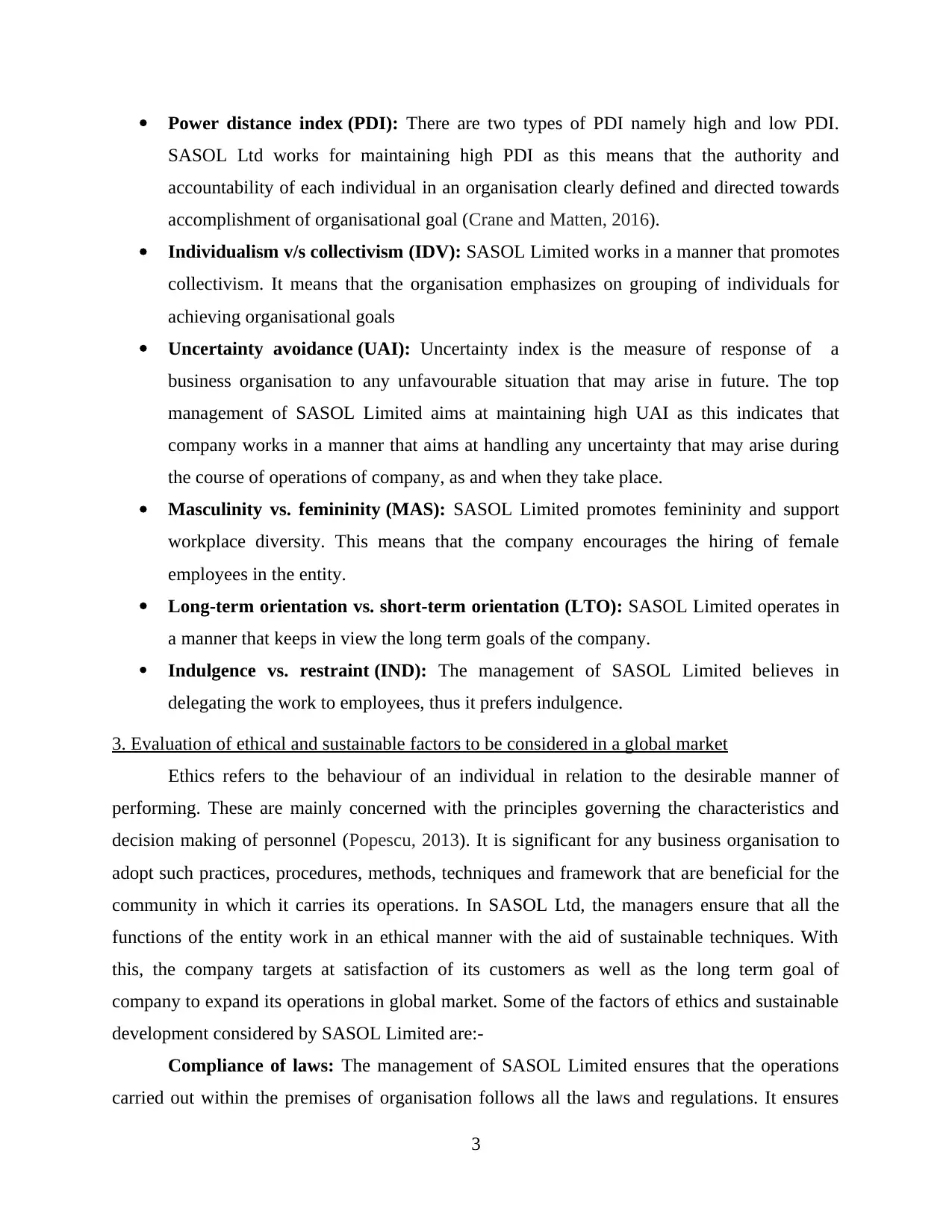
Power distance index (PDI): There are two types of PDI namely high and low PDI.
SASOL Ltd works for maintaining high PDI as this means that the authority and
accountability of each individual in an organisation clearly defined and directed towards
accomplishment of organisational goal (Crane and Matten, 2016).
Individualism v/s collectivism (IDV): SASOL Limited works in a manner that promotes
collectivism. It means that the organisation emphasizes on grouping of individuals for
achieving organisational goals
Uncertainty avoidance (UAI): Uncertainty index is the measure of response of a
business organisation to any unfavourable situation that may arise in future. The top
management of SASOL Limited aims at maintaining high UAI as this indicates that
company works in a manner that aims at handling any uncertainty that may arise during
the course of operations of company, as and when they take place.
Masculinity vs. femininity (MAS): SASOL Limited promotes femininity and support
workplace diversity. This means that the company encourages the hiring of female
employees in the entity.
Long-term orientation vs. short-term orientation (LTO): SASOL Limited operates in
a manner that keeps in view the long term goals of the company.
Indulgence vs. restraint (IND): The management of SASOL Limited believes in
delegating the work to employees, thus it prefers indulgence.
3. Evaluation of ethical and sustainable factors to be considered in a global market
Ethics refers to the behaviour of an individual in relation to the desirable manner of
performing. These are mainly concerned with the principles governing the characteristics and
decision making of personnel (Popescu, 2013). It is significant for any business organisation to
adopt such practices, procedures, methods, techniques and framework that are beneficial for the
community in which it carries its operations. In SASOL Ltd, the managers ensure that all the
functions of the entity work in an ethical manner with the aid of sustainable techniques. With
this, the company targets at satisfaction of its customers as well as the long term goal of
company to expand its operations in global market. Some of the factors of ethics and sustainable
development considered by SASOL Limited are:-
Compliance of laws: The management of SASOL Limited ensures that the operations
carried out within the premises of organisation follows all the laws and regulations. It ensures
3
SASOL Ltd works for maintaining high PDI as this means that the authority and
accountability of each individual in an organisation clearly defined and directed towards
accomplishment of organisational goal (Crane and Matten, 2016).
Individualism v/s collectivism (IDV): SASOL Limited works in a manner that promotes
collectivism. It means that the organisation emphasizes on grouping of individuals for
achieving organisational goals
Uncertainty avoidance (UAI): Uncertainty index is the measure of response of a
business organisation to any unfavourable situation that may arise in future. The top
management of SASOL Limited aims at maintaining high UAI as this indicates that
company works in a manner that aims at handling any uncertainty that may arise during
the course of operations of company, as and when they take place.
Masculinity vs. femininity (MAS): SASOL Limited promotes femininity and support
workplace diversity. This means that the company encourages the hiring of female
employees in the entity.
Long-term orientation vs. short-term orientation (LTO): SASOL Limited operates in
a manner that keeps in view the long term goals of the company.
Indulgence vs. restraint (IND): The management of SASOL Limited believes in
delegating the work to employees, thus it prefers indulgence.
3. Evaluation of ethical and sustainable factors to be considered in a global market
Ethics refers to the behaviour of an individual in relation to the desirable manner of
performing. These are mainly concerned with the principles governing the characteristics and
decision making of personnel (Popescu, 2013). It is significant for any business organisation to
adopt such practices, procedures, methods, techniques and framework that are beneficial for the
community in which it carries its operations. In SASOL Ltd, the managers ensure that all the
functions of the entity work in an ethical manner with the aid of sustainable techniques. With
this, the company targets at satisfaction of its customers as well as the long term goal of
company to expand its operations in global market. Some of the factors of ethics and sustainable
development considered by SASOL Limited are:-
Compliance of laws: The management of SASOL Limited ensures that the operations
carried out within the premises of organisation follows all the laws and regulations. It ensures
3
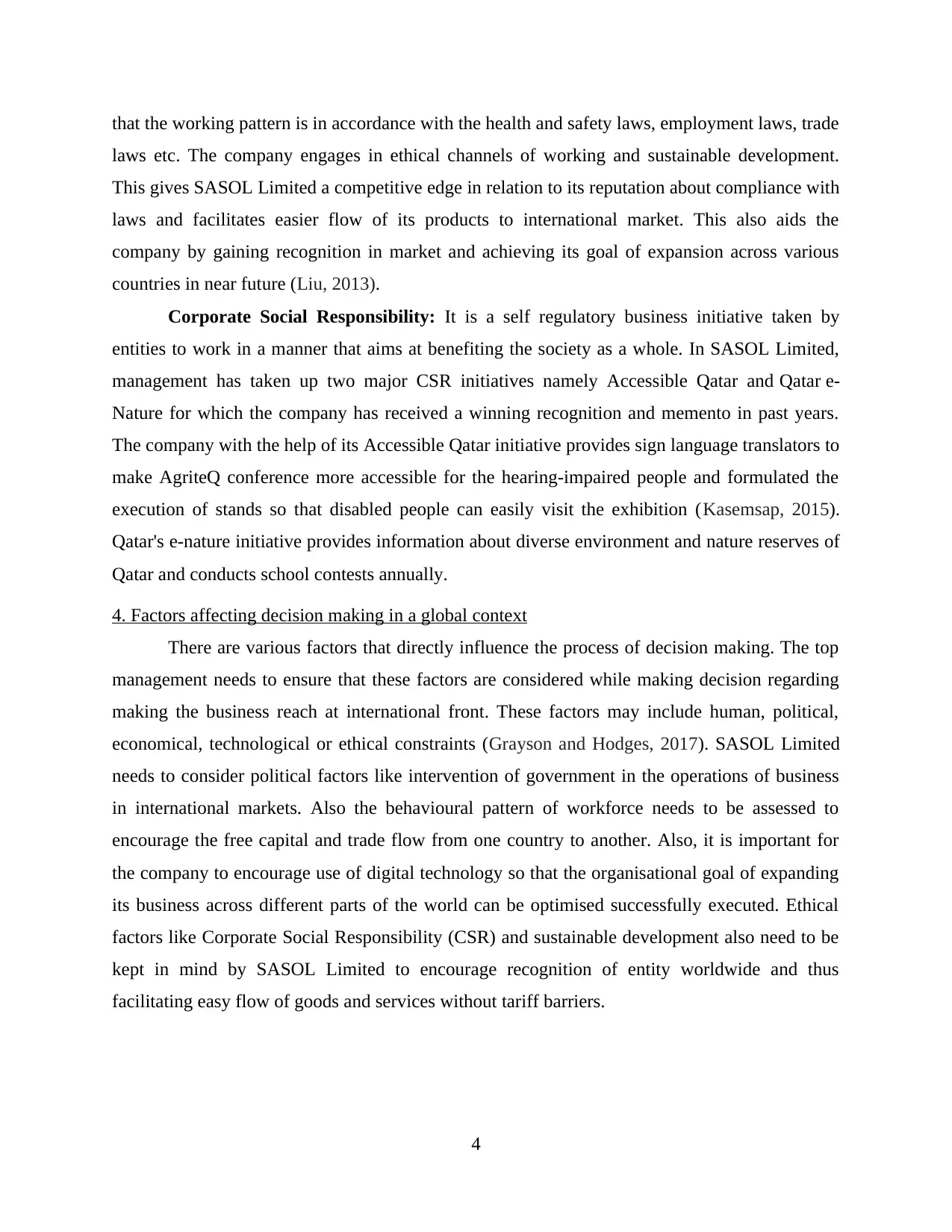
that the working pattern is in accordance with the health and safety laws, employment laws, trade
laws etc. The company engages in ethical channels of working and sustainable development.
This gives SASOL Limited a competitive edge in relation to its reputation about compliance with
laws and facilitates easier flow of its products to international market. This also aids the
company by gaining recognition in market and achieving its goal of expansion across various
countries in near future (Liu, 2013).
Corporate Social Responsibility: It is a self regulatory business initiative taken by
entities to work in a manner that aims at benefiting the society as a whole. In SASOL Limited,
management has taken up two major CSR initiatives namely Accessible Qatar and Qatar e-
Nature for which the company has received a winning recognition and memento in past years.
The company with the help of its Accessible Qatar initiative provides sign language translators to
make AgriteQ conference more accessible for the hearing-impaired people and formulated the
execution of stands so that disabled people can easily visit the exhibition (Kasemsap, 2015).
Qatar's e-nature initiative provides information about diverse environment and nature reserves of
Qatar and conducts school contests annually.
4. Factors affecting decision making in a global context
There are various factors that directly influence the process of decision making. The top
management needs to ensure that these factors are considered while making decision regarding
making the business reach at international front. These factors may include human, political,
economical, technological or ethical constraints (Grayson and Hodges, 2017). SASOL Limited
needs to consider political factors like intervention of government in the operations of business
in international markets. Also the behavioural pattern of workforce needs to be assessed to
encourage the free capital and trade flow from one country to another. Also, it is important for
the company to encourage use of digital technology so that the organisational goal of expanding
its business across different parts of the world can be optimised successfully executed. Ethical
factors like Corporate Social Responsibility (CSR) and sustainable development also need to be
kept in mind by SASOL Limited to encourage recognition of entity worldwide and thus
facilitating easy flow of goods and services without tariff barriers.
4
laws etc. The company engages in ethical channels of working and sustainable development.
This gives SASOL Limited a competitive edge in relation to its reputation about compliance with
laws and facilitates easier flow of its products to international market. This also aids the
company by gaining recognition in market and achieving its goal of expansion across various
countries in near future (Liu, 2013).
Corporate Social Responsibility: It is a self regulatory business initiative taken by
entities to work in a manner that aims at benefiting the society as a whole. In SASOL Limited,
management has taken up two major CSR initiatives namely Accessible Qatar and Qatar e-
Nature for which the company has received a winning recognition and memento in past years.
The company with the help of its Accessible Qatar initiative provides sign language translators to
make AgriteQ conference more accessible for the hearing-impaired people and formulated the
execution of stands so that disabled people can easily visit the exhibition (Kasemsap, 2015).
Qatar's e-nature initiative provides information about diverse environment and nature reserves of
Qatar and conducts school contests annually.
4. Factors affecting decision making in a global context
There are various factors that directly influence the process of decision making. The top
management needs to ensure that these factors are considered while making decision regarding
making the business reach at international front. These factors may include human, political,
economical, technological or ethical constraints (Grayson and Hodges, 2017). SASOL Limited
needs to consider political factors like intervention of government in the operations of business
in international markets. Also the behavioural pattern of workforce needs to be assessed to
encourage the free capital and trade flow from one country to another. Also, it is important for
the company to encourage use of digital technology so that the organisational goal of expanding
its business across different parts of the world can be optimised successfully executed. Ethical
factors like Corporate Social Responsibility (CSR) and sustainable development also need to be
kept in mind by SASOL Limited to encourage recognition of entity worldwide and thus
facilitating easy flow of goods and services without tariff barriers.
4
⊘ This is a preview!⊘
Do you want full access?
Subscribe today to unlock all pages.

Trusted by 1+ million students worldwide
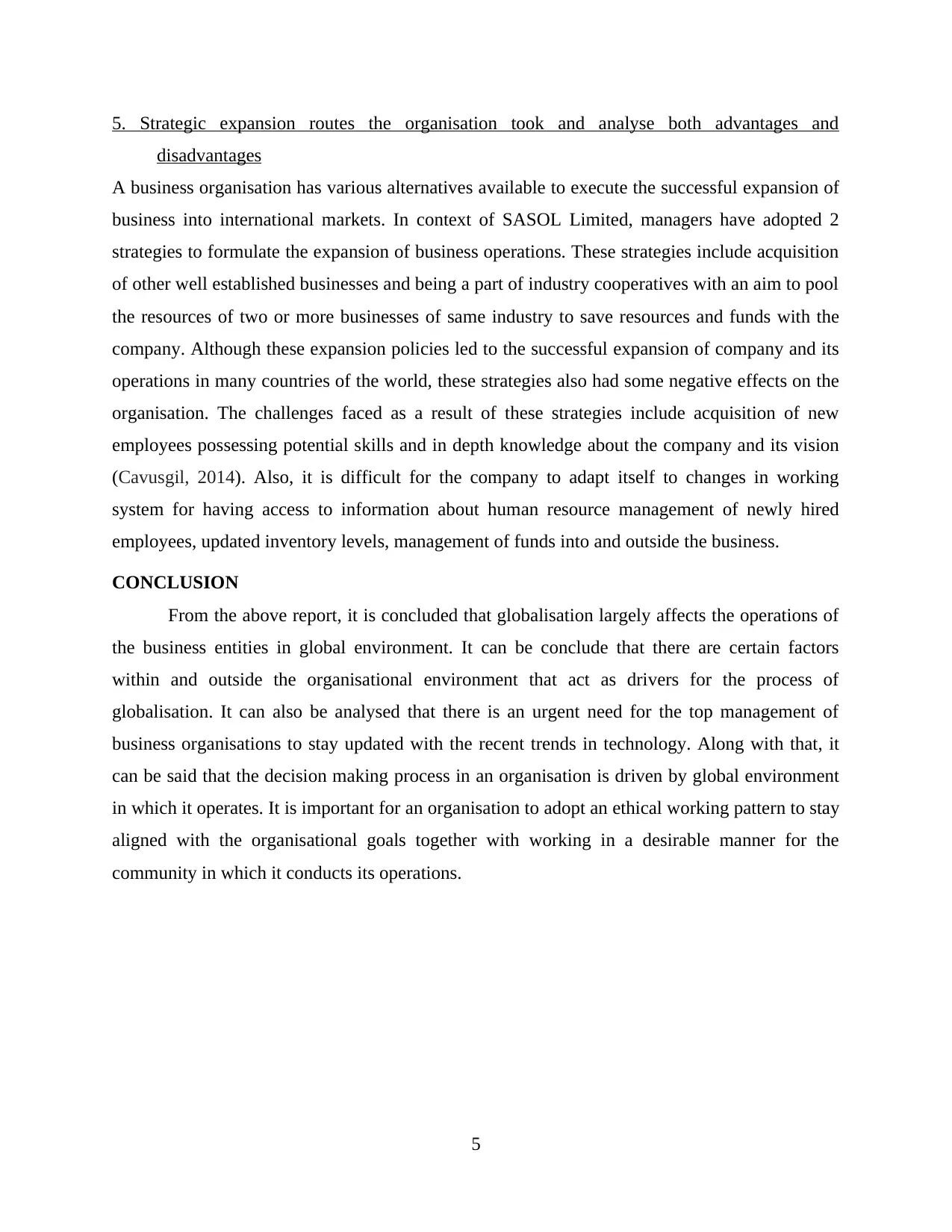
5. Strategic expansion routes the organisation took and analyse both advantages and
disadvantages
A business organisation has various alternatives available to execute the successful expansion of
business into international markets. In context of SASOL Limited, managers have adopted 2
strategies to formulate the expansion of business operations. These strategies include acquisition
of other well established businesses and being a part of industry cooperatives with an aim to pool
the resources of two or more businesses of same industry to save resources and funds with the
company. Although these expansion policies led to the successful expansion of company and its
operations in many countries of the world, these strategies also had some negative effects on the
organisation. The challenges faced as a result of these strategies include acquisition of new
employees possessing potential skills and in depth knowledge about the company and its vision
(Cavusgil, 2014). Also, it is difficult for the company to adapt itself to changes in working
system for having access to information about human resource management of newly hired
employees, updated inventory levels, management of funds into and outside the business.
CONCLUSION
From the above report, it is concluded that globalisation largely affects the operations of
the business entities in global environment. It can be conclude that there are certain factors
within and outside the organisational environment that act as drivers for the process of
globalisation. It can also be analysed that there is an urgent need for the top management of
business organisations to stay updated with the recent trends in technology. Along with that, it
can be said that the decision making process in an organisation is driven by global environment
in which it operates. It is important for an organisation to adopt an ethical working pattern to stay
aligned with the organisational goals together with working in a desirable manner for the
community in which it conducts its operations.
5
disadvantages
A business organisation has various alternatives available to execute the successful expansion of
business into international markets. In context of SASOL Limited, managers have adopted 2
strategies to formulate the expansion of business operations. These strategies include acquisition
of other well established businesses and being a part of industry cooperatives with an aim to pool
the resources of two or more businesses of same industry to save resources and funds with the
company. Although these expansion policies led to the successful expansion of company and its
operations in many countries of the world, these strategies also had some negative effects on the
organisation. The challenges faced as a result of these strategies include acquisition of new
employees possessing potential skills and in depth knowledge about the company and its vision
(Cavusgil, 2014). Also, it is difficult for the company to adapt itself to changes in working
system for having access to information about human resource management of newly hired
employees, updated inventory levels, management of funds into and outside the business.
CONCLUSION
From the above report, it is concluded that globalisation largely affects the operations of
the business entities in global environment. It can be conclude that there are certain factors
within and outside the organisational environment that act as drivers for the process of
globalisation. It can also be analysed that there is an urgent need for the top management of
business organisations to stay updated with the recent trends in technology. Along with that, it
can be said that the decision making process in an organisation is driven by global environment
in which it operates. It is important for an organisation to adopt an ethical working pattern to stay
aligned with the organisational goals together with working in a desirable manner for the
community in which it conducts its operations.
5
Paraphrase This Document
Need a fresh take? Get an instant paraphrase of this document with our AI Paraphraser
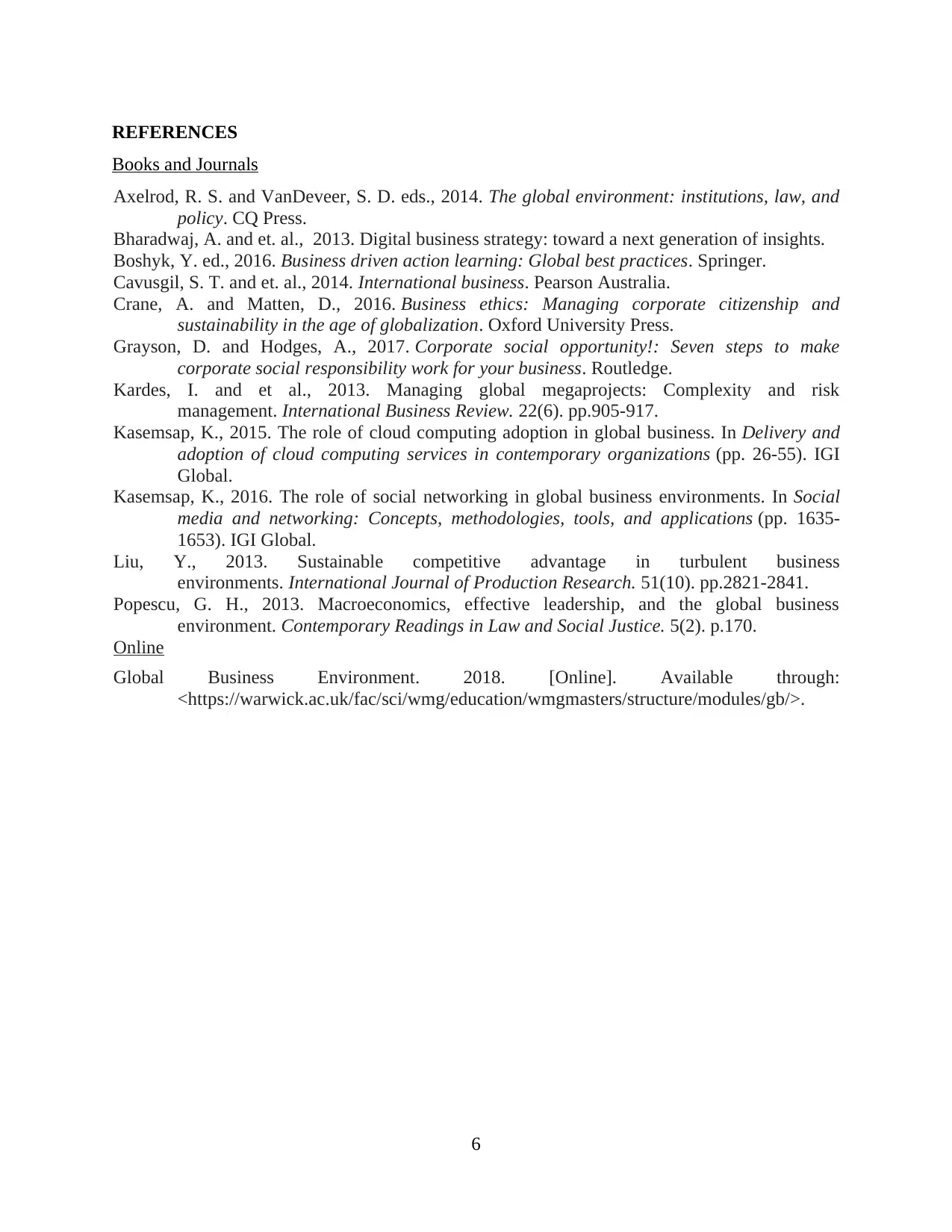
REFERENCES
Books and Journals
Axelrod, R. S. and VanDeveer, S. D. eds., 2014. The global environment: institutions, law, and
policy. CQ Press.
Bharadwaj, A. and et. al., 2013. Digital business strategy: toward a next generation of insights.
Boshyk, Y. ed., 2016. Business driven action learning: Global best practices. Springer.
Cavusgil, S. T. and et. al., 2014. International business. Pearson Australia.
Crane, A. and Matten, D., 2016. Business ethics: Managing corporate citizenship and
sustainability in the age of globalization. Oxford University Press.
Grayson, D. and Hodges, A., 2017. Corporate social opportunity!: Seven steps to make
corporate social responsibility work for your business. Routledge.
Kardes, I. and et al., 2013. Managing global megaprojects: Complexity and risk
management. International Business Review. 22(6). pp.905-917.
Kasemsap, K., 2015. The role of cloud computing adoption in global business. In Delivery and
adoption of cloud computing services in contemporary organizations (pp. 26-55). IGI
Global.
Kasemsap, K., 2016. The role of social networking in global business environments. In Social
media and networking: Concepts, methodologies, tools, and applications (pp. 1635-
1653). IGI Global.
Liu, Y., 2013. Sustainable competitive advantage in turbulent business
environments. International Journal of Production Research. 51(10). pp.2821-2841.
Popescu, G. H., 2013. Macroeconomics, effective leadership, and the global business
environment. Contemporary Readings in Law and Social Justice. 5(2). p.170.
Online
Global Business Environment. 2018. [Online]. Available through:
<https://warwick.ac.uk/fac/sci/wmg/education/wmgmasters/structure/modules/gb/>.
6
Books and Journals
Axelrod, R. S. and VanDeveer, S. D. eds., 2014. The global environment: institutions, law, and
policy. CQ Press.
Bharadwaj, A. and et. al., 2013. Digital business strategy: toward a next generation of insights.
Boshyk, Y. ed., 2016. Business driven action learning: Global best practices. Springer.
Cavusgil, S. T. and et. al., 2014. International business. Pearson Australia.
Crane, A. and Matten, D., 2016. Business ethics: Managing corporate citizenship and
sustainability in the age of globalization. Oxford University Press.
Grayson, D. and Hodges, A., 2017. Corporate social opportunity!: Seven steps to make
corporate social responsibility work for your business. Routledge.
Kardes, I. and et al., 2013. Managing global megaprojects: Complexity and risk
management. International Business Review. 22(6). pp.905-917.
Kasemsap, K., 2015. The role of cloud computing adoption in global business. In Delivery and
adoption of cloud computing services in contemporary organizations (pp. 26-55). IGI
Global.
Kasemsap, K., 2016. The role of social networking in global business environments. In Social
media and networking: Concepts, methodologies, tools, and applications (pp. 1635-
1653). IGI Global.
Liu, Y., 2013. Sustainable competitive advantage in turbulent business
environments. International Journal of Production Research. 51(10). pp.2821-2841.
Popescu, G. H., 2013. Macroeconomics, effective leadership, and the global business
environment. Contemporary Readings in Law and Social Justice. 5(2). p.170.
Online
Global Business Environment. 2018. [Online]. Available through:
<https://warwick.ac.uk/fac/sci/wmg/education/wmgmasters/structure/modules/gb/>.
6
1 out of 8
Related Documents
Your All-in-One AI-Powered Toolkit for Academic Success.
+13062052269
info@desklib.com
Available 24*7 on WhatsApp / Email
![[object Object]](/_next/static/media/star-bottom.7253800d.svg)
Unlock your academic potential
Copyright © 2020–2026 A2Z Services. All Rights Reserved. Developed and managed by ZUCOL.




